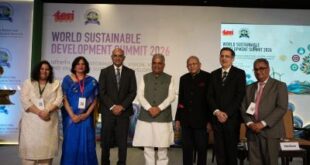The Institution of Engineering and Technology successfully concludes Academic Roundtable
Bangalore, 15th February 2024: The Institution of Engineering and Technology, a leading global engineering body, successfully concluded its academic round table on ‘Changing face of global engineering – calibrating India’s response’. The roundtable witnessed the successful convergence of industry leaders, academicians and regulatory bodies to chart a standardized industry-first, solution-oriented roadmap for the future of engineering education. The event featured three impact-driven panel discussions focused on paving the way for a more outcome-oriented Indian engineering education system, as per the NEP 2020. The discussion was chaired by Dr. Anil Sahasrabuddhe, Chairman – Chair NAAC, NBA, NETF, and also featured notable speakers such as Dr Amit Dutta, Director, AICTE; Dr Atul Chauhan, Chancellor, Amity University; Prof (Dr) Indranil Manna, President – Indian National Academy of Engineering and Vice Chancellor, BIT, Mesra, Ranchi and Mr Abhijeet Sinha, Program Director, Ease of Doing Business and National Highways for EV (NHEV))
“The IET is dedicated to fostering important discussions that lead to positive changes in the industry. India is rapidly becoming a top choice for Global Capability Centres, thanks to our skilled engineers. But there’s a big problem: the gap between industry and academia is getting wider, hindering our progress. India is also becoming a global powerhouse for engineering education but the quality of this education needs to be world class. This Roundtable will curate a roadmap to bridge this gap and navigate the changing streams of engineering education. These insights will greatly contribute towards shaping the future of engineering education for the next generation of aspiring technologists and thereby the country.”, said Shekhar Sanyal, Country Head and Director, IET India.
The event began with a discussion around ‘Where is Global engineering going and what is the skill gap?’, followed by conversations on ‘Outcome-based Education:Why is it critical?’. Speaking at the event, Dr Anil Sahasrabudhe, Chair NAAC, NBA, NETF, said “We need to train engineers to become lifelong learners and self-learners, as technology developments are advancing at an exponential rate. The digital revolution has greatly improved the accessibility of engineering education. Today, Indian students have access to free courses from leading global institutes like MIT and Harvard, as well as Indian platforms like SWAYAM. We are seeing innovative startups by high-school graduates from non-engineering backgrounds, who have acquired all their knowledge from YouTube. Therefore, we need to work towards a future where no region in India is without internet access, and therefore no region is deprived of learning opportunities.”
“There is still a dire requirement for more hands-on learning opportunities for students through industry-collaborative products and internships. We currently have 1.7 crore students and 75,000+ internship providers on a portal, which uses modern tools like AI to suggest internship opportunities based on the student’s interests, their locality/hometown and the opportunities available in the region. This is particularly essential for students in remote areas and Tier 2/Tier 3 cities.”, he added.
The second panel discussion highlighted that the engineering education system is a victimisation of meritocracy, and raised an important question – “What are we awarding as merit – rote learning or independent thinking?” It further highlighted that teachers are also under immense pressure to deliver learning in just 60 minutes. Additionally, the panel deliberated on the need for institutions to create a formal and transparent student feedback mechanism to assess the efficiency of teachers, rather than simply evaluating them as ‘researchers’. It emphasized the necessity for a revamped evaluation system that considers not only the quantity of research conducted by a professor but also the quality of their teaching.
Speaking on the steps taken by AICTE to bridge learning gaps, Amit Dutta, Director, All India Council for Technical Education, said “We have introduced an intervention through a portal called ‘Parakh’, which serves as a gap analysis tool for both students and faculty members. I’m pleased to share that currently, over six lakh students have registered, and more than 2.5 million students have completed their gap analysis tests. The portal identifies gaps in students’ knowledge before they graduate from the institution, enabling the implementation of necessary remedial measures to address these gaps before the students graduate.”
To address the role of technology in delivering engineering education, the third panel discussion explored how technological advancements shape the methods and approaches used in engineering education, in the context of a dynamic global paradigm. It also identified key initiatives and measures that can position India as an appealing destination for prospective engineering students globally, fostering an environment that nurtures excellence and innovation in the field.
The Institution of Engineering and Technology will present the outcomes and conclusions of the day-long discussion as a policy recommendation roadmap to the Ministry of Education. Additionally, the global engineering body will issue an advisory note to educators and higher education institutes to initiate an actionable roadmap towards improving India’s engineering education ecosystem.
 Newspatrolling.com News cum Content Syndication Portal Online
Newspatrolling.com News cum Content Syndication Portal Online






